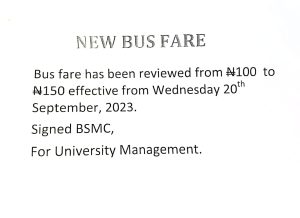By Amidat Ahmad

The recent increase in bus fare from ₦100 to ₦150, effective from September 20th, certainly raises important issues that warrant discussion. This change appears to be a direct response to economic factors and policies surrounding fuel subsidy and the subsequent hike in fuel prices.
On September 20th, we witnessed a sudden and, for many, unexpected increase in the bus fare, from ₦100 to ₦150. This move, signed by the Bus Service Management Committee ( BSMC) on behalf of the university management, undoubtedly has far-reaching consequences for the students. It’s essential to approach this issue with an open mind, considering both sides of the coin.
From an economic perspective, we must acknowledge the challenges associated with fuel subsidy. Subsidies can drain government finances and create inefficiencies in the market. By reducing or removing them, the government aims to reallocate resources for critical sectors like education and healthcare. In the long run, this could lead to a more stable economic environment, benefiting all citizens, including students.
The people affected by the subsidy include commercial transporters, while equally affecting the commercial commuters, due to increase in transportation fees. It was recently that the commuting price from and to Usmanu Danfodiyo, Sokoto bus stops rose from ₦50 to ₦100.
Why ₦150 again? So, it’s safe to say the BSMC is not considerate towards the welfare of the students.
The immediate impact on us, the students ugh. A ₦50 increase in bus fare might seem modest, but for many students
managing tight budgets, it’s a noticeable burden. The university campus bus service is a lifeline for commuting students, and any cost increase directly affects their daily lives.
Moreover, the timing of this hike, in the midst of ongoing economic challenges, is undeniably challenging. Students are already grappling with tuition fees, textbook costs, and other living expenses. The fare increase adds another layer of financial pressure.
As a student affected by the new change, we advocate for a balanced approach. While understanding the economic rationale behind the fare hike, we also call for empathy towards students facing increased financial strain. It is essential that the university management and the BSMC considers implementing measures to support students during this transition.
The importance of transparency and open communication between the university management and students will create clearer understanding of the reasons behind this decision and the plans for the future can alleviate concerns and foster a sense of cooperation.
The bus fare hike, a direct result of the complex interplay between economic policy and student welfare, deserves attention.
We beseech the BSMC and the school management to view the impact the hike will cause in the lives of the students and come up with a better solution to tackle the problem instead of hiking the price.
